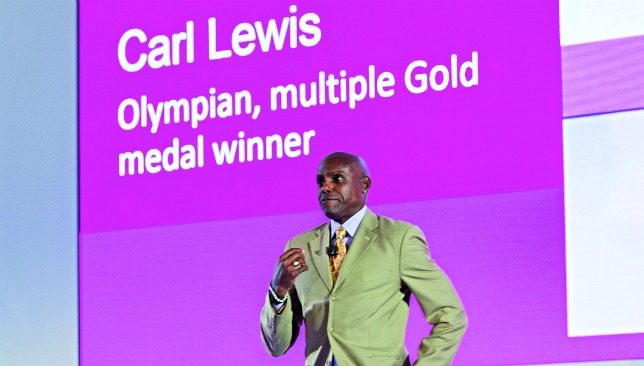
The event brought together a host of individuals from the health and fitness sector to mark the 10th anniversary of Daman.
About 300 local and international health sector specialists gathered to discuss how to best promote health and wellness within communities, plus ways for international best practices to be applied throughout the UAE in order to improve public health.
Sprint king Lewis was a highlight of the event. The 55-year-old made a name for himself across a glittering athletics career which spanned nearly two decades, during which he won nine Olympic gold medals.
The four-time long jump gold medalist and two-time 100m champion admitted it was important to get the healthy lifestyle message across to children in the UAE with obesity a glaring issue in the region.
“It is something that affects the world, not just this region,” said Lewis, now an athletics coach at the University of Houston.
“Talking about obesity and health and living healthier lifestyles, especially for young people, that’s why I’m here. The focus of the conference is on getting young people active in sports and understanding more about nutrition.
“If you can live healthier at a younger age, it carries on for life.”
Had the pleasure of interviewing nine-time Olympic champion Carl Lewis this morning. Said he's a fan of my work in @Sport360 pic.twitter.com/tkMYSkRfdS
— Matt Jones (@MattJones360) October 31, 2016
After retiring once his last gold medal in the long jump was won at the 1996 Atlanta Games, Lewis has remained active in sporting circles.
He has delivered talks on nutrition and the benefits of a healthy and active lifestyle for the last 20 years, as well as being an United Nations ambassador on nutrition.
The Alabama-native preached the benefits of rolling out the message to schools, something he said has been deteriorating in the US.
“You have to have a concerted effort in schools so you educate young people about sports and activities,” added Lewis.
“In the US there’s been a sea change in recent years. We’ve taken PE out of schools.
“When children are engaged and you create programmes for them, they get excited, it’s just we’ve taken it out and now a lot of sport in America has become pay to play. It’s out of schools so now teachers are hiring coaches to teach their kids.
“The whole paradigm has shifted to specialisation in all ages, doing one sport only when they should be doing multiple sports to develop muscle movement.
“They were engaged in classes but we took it out, so now they’re trying to put it back in.”